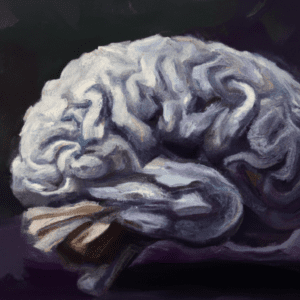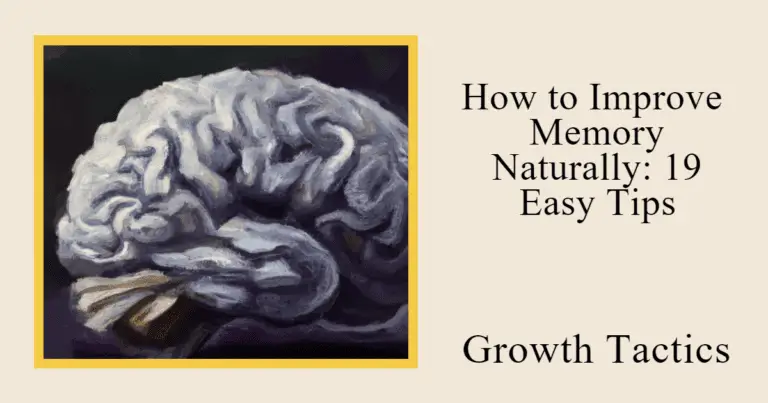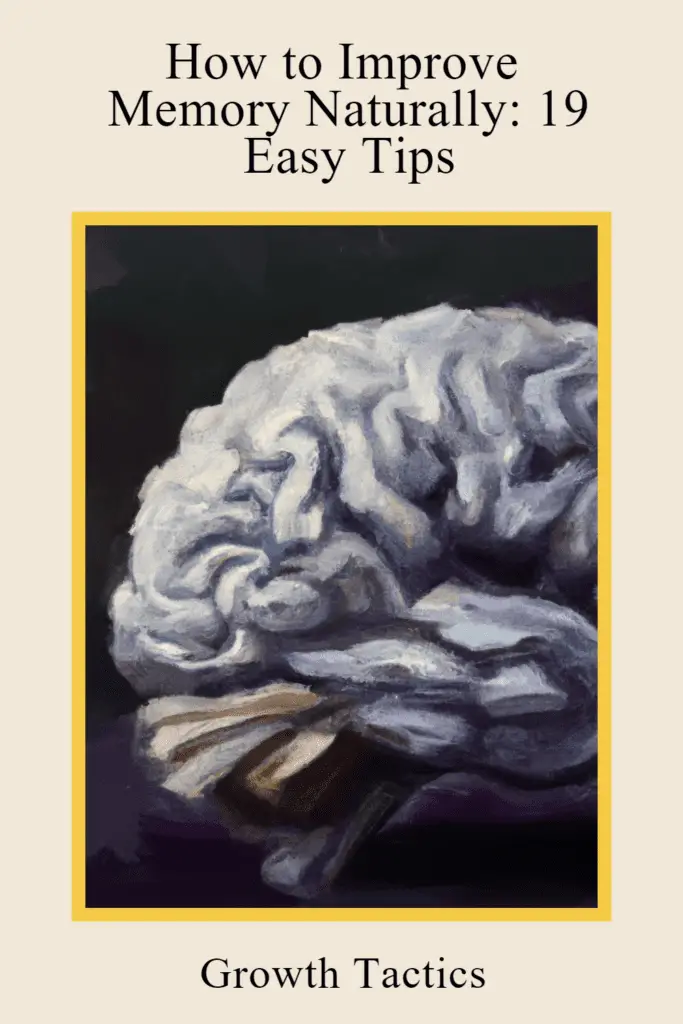Having a good memory is an essential life skill, but it can be hard to maintain. Whether you’re trying to remember facts for an exam or want to stay sharp, there are plenty of ways to improve your memory naturally.
From diet and lifestyle changes to mental exercises, here are 19 natural ways to improve memory. By following these suggestions, you can increase your cognitive abilities and keep your mind sharp for years to come.
Jump To Section
What is short-term memory?
Short-term memory is an important cognitive ability that allows people to store information for a short period. It helps us remember things like phone numbers, directions, and other tasks that require quick recall.
Short-term memory can be divided into two types: working memory, which involves using and manipulating information stored in our heads, and episodic memory, which is used to remember events and experiences from our past.
Generally, short-term memory holds information for about 15 to 30 seconds before it is forgotten.
However, if the information is rehearsed or repeated often enough it can become long-term memory. This type of cognitive flexibility allows us to use both short and long-term memories when necessary.
What is long-term memory?
Long-term memory is the ability to remember information over a long period, typically from days to years. It is responsible for storing the critical events and experiences that we have in our lives.
Long-term memory differs from short-term memory in that it holds more complex information for longer periods. It also has a much larger capacity than short-term memory, allowing us to store vast amounts of information over our lifespan.
The process of forming these memories involves sensory perception, attention, working memory, and finally storage and retrieval processes. Long-term memory can be further divided into explicit or declarative memories (those that are consciously remembered) and implicit or procedural memories (those that are unconsciously remembered).
This type of memory plays a critical role in allowing us to recall past experiences, which helps shape our behavior and decision-making.
Causes of memory losses
Memory loss can be caused by a variety of factors, including damage to the brain, aging, and lifestyle. Memory is a key part of our cognitive function, helping us remember and recall information. When we don’t get enough sleep or exercise, it can affect our memory skills and lead to memory loss.
Similarly, traumatic events such as accidents or illnesses can also damage brain function and lead to memory loss. As we age our cognitive decline can also affect learning and memory capabilities.
Therefore, we need to maintain healthy lifestyles and habits to keep our memories sharp throughout our lives. Regular exercise, proper nutrition, and getting enough rest are all crucial for preserving good memory skills and preventing further memory loss.
How to improve memory naturally

Play brain games
Brain games are a great way to keep your brain healthy and prevent memory loss. Brain training can help protect your brain from changes associated with age-related memory loss. Games such as crossword puzzles, Soduku, memory match, and even chess can help keep your mind sharp.
Not only do these activities improve your cognitive skills, but they also provide a fun and effective way to stay mentally active. They can even increase the connections between neurons in your brain!
Regularly playing brain games can help you maintain or improve executive functions such as planning, organization, strategy formation, and decision-making.
Playing these games can also help reduce the risk of developing Alzheimer’s disease later in life. So don’t be afraid to engage in some brain training today.
It could make all the difference!
Proper sleep is crucial for memory

Proper sleep is essential for memory. In fact, some studies show that good sleep can improve recall and retention by as much as 40%. It helps to keep your memory sharp, enabling you to remember things more effectively. During sleep, the brain processes and stores new information that has been taken in throughout the day. This means that if you don’t get enough sleep, your brain won’t have time to properly store new memories.
Not getting enough sleep can also lead to difficulty concentrating and focusing on tasks, as well as poor decision-making and reaction times. Additionally, research has shown that proper sleep can even improve long-term memory formation and recall.
To keep your memory functioning at its best, it’s important to make sure you get enough quality rest every night. Aim for seven to nine hours of uninterrupted sleep each night and practice good sleeping habits such as avoiding screens before bedtime, managing stress levels through relaxation techniques, and exercising regularly during the day.
Stay physically active
Staying physically active is essential for overall health and well-being. Regular physical activity can help you maintain a healthy weight, reduce your risk of chronic disease, improve your sleep quality, and boost your energy levels. Additionally, staying physically active can also improve memory.
Studies have shown that regular exercise increases the production of chemicals in the brain that promote neuron growth and strengthen connections between brain cells which helps to improve memory.
Exercise can also help to increase focus and concentration, both of which are important for improved memory.
There are many different types of physical activities that you can do to stay active, such as walking, biking, swimming, or playing sports.
No matter what type of activity you choose to do, it’s important to make sure that it’s enjoyable so that you will stick with it long-term and be able to reap all the benefits of improved memory and general health.
Watch what you eat
Eating the right foods is essential for promoting healthy brain activity, improving memory, and even preventing memory loss. Eating a balanced diet, with plenty of fruits, vegetables, grains, and proteins is important for providing your brain with the nutrients it needs to function properly.
Certain “brain foods” are also thought to help improve memory and concentration. These include omega-3 fatty acids found in fish, nuts, and seeds, dark leafy greens like spinach and kale, whole grains like oats, blueberries, and other antioxidant-rich fruits, as well as eggs, beans, and yogurt.
Eating these types of foods will give your brain the fuel it needs to stay in peak condition and help you improve memory or prevent memory loss.
Learn to manage your stress
Stress can be a real burden for many people, and it is important to learn how to manage it to lead a balanced, healthy life. Taking regular breaks throughout the day can be a great way to reduce stress and improve mental well-being. Exercise is also a great way to release tension and increase endorphins.
Additionally, taking time out of your day to practice relaxation techniques such as yoga or meditation can help you relax, manage stress levels, improve brain health, and increase your memory skills.
Practicing mindfulness can also help to keep stress levels low by focusing on the present moment rather than worrying about the future.
Finally, getting enough sleep at night, as previously discussed, can be beneficial for reducing stress levels and improving overall health.
Meditate to boost your memory

Meditation is a great way to boost your memory. It helps you to focus on the present moment and can improve your concentration, helping you remember things more easily.
Regular meditation can help reduce stress and anxiety, which can interfere with memory recall. By focusing on your breath and allowing yourself to relax, you can enhance your ability to remember things better.
Additionally, practicing mindfulness techniques such as yoga or tai chi is a great way to increase your brain’s ability to store information for longer periods. Taking just a few minutes each day to meditate can help improve your memory and sharpen your mind.
Use mnemonic devices to recall information
Mnemonic devices are a great way to help with memory consolidation. One study found a 20% improvement in memory and recall when using mnemonic devices. Mnemonics are memory aids that use associations between easy-to-remember concepts and more complex information.
They can be used in many different ways, including rhymes, acronyms, visual images, and mental models. An example of a mnemonic device is the acronym “ROY G BIV” which stands for the colors of the rainbow: Red, Orange, Yellow, Green, Blue, Indigo, and Violet.
Mnemonic devices can be used to remember concepts in any subject or area of life. When using mnemonic devices it is important to make sure that you associate the simple concept with the more complex information for it to be effective.
With this method of memory consolidation, you will quickly find yourself remembering things much easier than before!
Make use of all your senses
Our senses are the key to unlocking our memories, so it’s important to make use of them. Sight, hearing, smell, taste, and touch can all be used to boost memory in different ways.
Visualizing images can help imprint memory into our minds. Listening to music or sounds can also help us recall past events.
Smelling familiar scents, like perfume or food, can trigger memories as well. The sense of taste can be a powerful tool for remembering things. It’s always easier to remember the flavor of your favorite food than a random set of numbers.
Finally, touching something that we associate with an event or person can bring back those memories instantly. Our senses are powerful tools that should not be ignored because they are among the best methods for boosting our memories!
Repetition is key to remembering
Repetition is key to remembering. It helps to enhance memory and recall information more accurately. Repetition helps to strengthen the neural pathways in the brain, making it easier for us to remember information.
By repeating something, we can better understand and recall it when needed. This can be done by simply reading a piece of text multiple times, or by engaging in activities that involve memorizing facts or phrases.
Repetition can also be used to improve one’s ability to focus on a task and pay attention for longer periods. It provides an opportunity for our brain cells to practice what they have learned and become more proficient at retaining information, aiding in memory retention and recall.
Overall, repetition is an important tool that can help with enhancing one’s memory and recalling information accurately.
Limit your alcohol usage
Limiting your alcohol usage is a great way to improve your cognitive abilities. Alcohol hurts the brain and can lead to decreased concentration, memory problems, and difficulty in problem-solving. It can also damage the communication pathways between neurons in the brain.
Limiting alcohol use will help to reduce these effects and improve your long-term cognitive abilities. Studies have also shown that by limiting alcohol use you can reduce your risk of developing dementia later in life.
So if you’re looking to increase your mental performance, take control of your drinking habits and limit your alcohol consumption. You’ll feel better now and thank yourself later!
Brain boosting supplements
Brain-boosting supplements have become increasingly popular as a way to increase cognitive function and help improve memory. These supplements contain ingredients that are said to have positive effects on the brain, such as antioxidants, vitamins, minerals, and other active compounds.
It is believed that these nutrients support healthy brain function by providing essential nutrients and helping to protect the brain from damage caused by aging and environmental stressors.
Additionally, certain supplements may also help to improve memory, focus, energy levels, and overall mental performance. While research has yet to conclusively prove the effectiveness of these supplements in improving memory or cognitive performance in humans, some studies suggest they may be able to provide beneficial effects.
Ultimately, it is important to speak with your doctor before taking any brain-boosting supplement to ensure you are getting the right dosage for your individual needs.
Increase Your Omega-3 Fatty Acids

Boosting your brain power by increasing your intake of Omega-3 fatty acids is a great way to do so. Omega-3 fatty acids have been linked to better cognitive performance, improved memory, and improved overall brain function.
Studies have shown that people who consume more Omega-3s are less likely to suffer from depression, anxiety, and other mental health issues.
In addition to this, they can help reduce inflammation in the body, which may provide numerous health benefits as well. So don’t forget to add some fish or flaxseed oil into your diet for a daily boost of Omega-3 fatty acids!
Keep things organized
Organizing your life can be a great way to improve concentration and focus. Whether it’s your workspace, bedroom, kitchen, or any other area, taking time to organize things can help you stay on track and make sure that you have the right tools to complete tasks quickly and easily.
Make sure that all of your items have their designated place so that you know where everything is when you need it. Tidy up regularly and take out any unnecessary clutter.
This will also help with mental clarity.
Additionally, break down long-term projects into smaller tasks and create a timeline for each one so that it’s easier to focus on them one by one. This helps to reduce distractions and keeps you motivated in the long run.
Always try to learn new things
Learning new things is a great way to keep your mind active and young. It helps to improve cognitive function and can even prevent mental decline as you age. From reading a book, taking up a new hobby, learning a language, or trying something completely different, the possibilities for learning something new are endless.
Plus, when we learn something new it can help spark creativity and increase our problem-solving abilities. So don’t be afraid to challenge yourself and try something new! You never know what you might learn or where it could lead.
Don’t try to memorize too much
When it comes to learning and memorizing new information, it is often best not to try to do too much at once. Trying to learn and remember too much in one go can be overwhelming and difficult for many people. A better approach is to break the material into small chunks.
This way, you can focus on learning one piece of information at a time, rather than trying to take it all in at once.
By breaking down your study material into smaller sections, you will be able to more easily remember what you have learned over time. Not only that, but you will also save yourself a lot of stress by taking things slowly and memorizing small amounts of information at a time.
Stay hydrated

Staying hydrated is essential for our health and well-being, as it plays an important role in daily life. Our bodies are composed of mostly water, so it stands to reason that drinking enough of it is essential for survival.
Not only does staying hydrated help keep you healthy and alert, but it also helps with memory and cognitive function.
Studies have shown that even mild dehydration can lead to a decrease in mental performance, making it difficult to recall information or think clearly. This is why it’s important to make sure you’re drinking the recommended eight glasses of water per day.
Water helps boost your energy levels and keeps your cells functioning properly, which results in better concentration, improved memory, and increased cognitive function. So if you want to stay sharp and focused throughout the day, make sure you’re getting plenty of fluids!
Drink coffee or green tea
Coffee and green tea have become popular beverages due to their health benefits, but both can also enhance concentration and memory.
Coffee contains caffeine, which helps you stay alert, while green tea has an amino acid called l-theanine that promotes a relaxed state of alertness.
Studies have found that caffeine from coffee can improve short-term memory recall and can help with focusing on tasks for longer periods. Green tea is also known for its ability to increase alertness, as well as having a positive effect on long-term memory recall.
Whether you choose to drink coffee or green tea, the key is moderation. Too much caffeine can lead to restlessness and irritability and interfere with sleep patterns. Drinking either beverage in moderation may help support your concentration levels and improve your memory recall.
Eat less sugar
Cutting down on sugar intake can be a great way to experience improved cognitive performance. Eating too much sugar can cause your blood glucose levels to fluctuate, which can lead to fatigue, difficulty concentrating, and memory loss.
If you want to improve your cognitive performance, try cutting back on the number of sugary snacks and drinks you consume.
Start by reducing your daily intake of added sugars, such as candy and soda. Instead, focus on eating more complex carbohydrates like whole wheat bread and cereals that will give you sustained energy throughout the day.
Additionally, adding more protein-rich foods to your diet like eggs or fish will help fuel your brain with the essential nutrients it needs to function properly.
By taking the steps to limit the amount of sugar in your diet, you’ll be able to experience better cognitive performance in no time!
Limit distractions
Limiting distractions can have a positive impact on memory. Keeping the environment free of any disruption and noise will help keep the focus on the task at hand. This is especially important when studying or learning new skills, as it helps to ensure that information is being retained effectively.
Reducing external stimulation such as phones, TVs, or even conversation can lead to the improved recollection of facts and data. Ensuring that there are no distractions also helps to encourage a state of relaxation which allows for better concentration and improved memory recall.
Taking steps to limit distractions is an effective way for individuals to maximize their mental performance and retain information more efficiently.
Conclusion
Remember, the journey to a sharper mind isn’t a one-size-fits-all path; it requires understanding your unique needs and applying the strategies that resonate with your individual purpose. Embrace these natural methods as part of your leadership arsenal, not just to improve memory, but to cultivate a mind as resilient and adaptable as you are.
Each step you take on this journey not only strengthens your memory but also reinforces your capacity for effective decision-making and purposeful action. The mission is clear: prioritize yourself, harness these tools, and lead with unwavering mental clarity.
Did you enjoy this article on natural ways to improve your memory? Please share and subscribe below.


